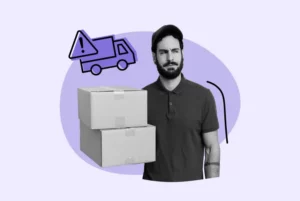
How to Accurately Calculate Shipping Costs
Shipping costs impact your business. Let’s explore how to accurately calculate shipping costs to boost sales and customer satisfaction.
Shipping, Tracking & Notifications
Boost customer experience and reduce support tickets
Realtime order and shipment tracking
Proactive order and shipping notifications
AI-Enhanced Discounted Labels
Predictive pre-purchase estimated delivery dates
Self-Serivce branded order tracking
Effortless experience delivered
Identify and Resolve Order Issues
Realtime order and shipment tracking
Make returns profitable and delight customers
Flexibility to define any return destinations & conditions
Simplify returns for your customers and team
Incentivize exchanges over returns
Returns management made easy for your team
Returns management made easy for your team
Easy claims and smart upsells
Understand why your customers are returning
In-Store & Curbside Pickup
Unify the online and the in-store experience
Hassle-free pickup experience for customers
In-Store dashboard to keep operations streamlined
In-Store and Online orders unified
Drive foot-traffic to your stores
Shipping, Tracking & Notifications
Boost customer experience and reduce support tickets
Realtime order and shipment tracking
Proactive order and shipping notifications
AI-Enhanced Discounted Labels
Predictive pre-purchase estimated delivery dates
Self-Serivce branded order tracking
Effortless experience delivered
Identify and Resolve Order Issues
Realtime order and shipment tracking
Make returns profitable and delight customers
Flexibility to define any return destinations & conditions
Simplify returns for your customers and team
Incentivize exchanges over returns
Returns management made easy for your team
Returns management made easy for your team
Understand why your customers are returning
In-Store & Curbside Pickup
Unify the online and the in-store experience
Hassle-free pickup experience for customers
In-Store Dashboard to keep operations streamlined
In-Store and Online orders unified
Drive foot-traffic to your stores
Boost customer experience and reduce support tickets
Realtime order and shipment tracking
Proactive order and shipping notifications
AI-Enhanced Discounted Labels
Predictive pre-purchase estimated delivery dates
Self-Serivce branded order tracking
Effortless experience delivered
Make returns profitable and delight customers
Flexibility to define any return destinations & conditions
Simplify returns for your customers and team
Incentivize exchanges over returns
Returns management made easy for your team
Equip your team for precise return checks.
Easy claims and smart upsells
Understand why your customers are returning
Unify the online and the in-store experience
Hassle-free pickup experience for customers
In-Store Dashboard to keep operations streamlined
In-Store and Online orders unified
Drive foot-traffic to your stores
Find the answer to all your questions
Take a step by step trip through our functionality to see how we can improve your ecommerce processes.
Explore the most comon questions about WeSupply
Calculate the ROI that WeSupply can bring you
Read actionable articles on how to optimize your post-purchase experience and decrease support tickets
Get inspired by stories of how our customers implemented an effortless post-purchase experience
Wondering if WeSupply is a good fit for you? Read through our use cases to see how we can help you increase conversion & improve CX!
A Deep Dive into Top Companies' Order Tracking & Returns Strategy
Find the answer to all your questions
Explore the most comon questions about WeSupply
Calculate the ROI that WeSupply can bring you
Request a no strings attached review of your current shopping experience and missed conversion opportunities
Take a step by step trip through our functionality to see how we can improve your ecommerce processes.
Read actionable articles on how to optimize your post-purchase experience and decrease support tickets
Get inspired by stories of how our customers implemented an effortless post-purchase experience
A Deep Dive into Top Companies' Order Tracking & Returns Strategy
Wondering if WeSupply is a good fit for you? Read through our use cases to see how we can help you increase conversion & improve CX!

You don’t have to accept high shipping costs as inevitable; successful parcel contract negotiation in e-commerce can significantly cut down these costs and boost service quality.
Do you ever feel like you’re pouring money down the drain with your parcel shipping costs? If so, you’re not alone. Negotiating your parcel contract can be a game-changer for your businesses, helping to cut down on shipping costs and improve service quality. In this blog post, we’ll guide you through the secrets of successful parcel contract negotiation and how to overcome common challenges. Get ready to start saving money and boost your shipping efficiency!
Negotiating the right parcel contract can save e-commerce businesses money and improve service quality.
Negotiation strategies such as rebates, base rate caps, payment terms & termination fees should be considered to secure a favorable deal.
Leverage third party expertise for expert analysis of shipping data & ongoing monitoring/optimization for cost savings and improved service quality.
Effective parcel contract negotiation can lead to significant cost savings and improved service quality for e-commerce businesses. By understanding the ins and outs of carrier contracts, you can identify unnecessary costs and make well-informed decisions. Remember, shipping costs can eat up a huge chunk of a retailer’s operational budget, so why not take charge of the negotiation process and get the best possible deal?
The key is to do your research, stay firm in your negotiations, and leverage third-party expertise to ensure you get the most favorable carrier agreement.
Before diving into negotiations, it’s crucial to understand the key elements of a parcel contract. A typical parcel contract consists of rates and discounts, surcharges and fees, and service conditions. These components can be negotiated to optimize shipping costs and efficiency.
In the following sections, we’ll delve deeper into each element and explain their significance in parcel contract negotiations.
Shipping rates and discounts play a significant role in parcel contracts. Carriers offer different pricing tiers, and negotiating these rates can save you around 15 to 20 percent on shipping costs. To get the best deal, it’s essential to understand the carrier pricing structure and negotiate discounts during the contract negotiation process.
By comparing your current contract with the offers from other carriers, you can identify cost-saving opportunities and negotiate better pricing. Remember, a well-researched and informed approach can make all the difference in securing favorable rates and discounts in your parcel contract negotiation.
Surcharges and fees can significantly impact your overall shipping costs. Carriers often add charges like fuel charges, dimensional weight divisors, large package surcharges, and more. Identifying and negotiating these fees can help reduce your shipping expenses by a considerable margin.
To effectively negotiate surcharges and fees, it’s important to be well-versed in the various charges imposed by carriers. This includes residential delivery charges, delivery area surcharges, additional handling charges, and weekly pick-up fees. By understanding these fees, you can negotiate better terms and ultimately save money on your shipping costs.
Service conditions are another critical aspect of parcel contract negotiations. These include details such as pickup and delivery times, cargo liability, and other requirements for storing and transporting parcels. Negotiating service conditions can enhance shipping efficiency and keep customers happy.
By understanding and negotiating these terms, you can ensure a smoother shipping process and maintain high levels of customer satisfaction.
Now that you understand the key elements of a parcel contract, let’s explore various strategies that can lead to more favorable contracts. Implementing these strategies, such as rebates, base rate caps, and payment terms, can help you secure the best possible parcel contract for your e-commerce business.
In the following subsections, we’ll discuss each strategy in detail and explain how they can benefit your parcel contract negotiations.
Rebates are discounts off the published rate for services like FedEx Ground or UPS 2nd Day Air. Negotiating rebates with your carrier during the contract negotiation process can lead to better pricing. To get the most out of rebates, it’s essential to negotiate the best discounts possible and regularly check the contract to ensure the agreed-upon discounts are being applied.
It is important to understand the different types of rebates available and how they can be used.
Base rate caps refer to the negotiated minimum package charges that are lower than the published minimum package charge. These caps can help keep rate increases in check and are usually put into place at the end of the agreement.
Negotiating base rate caps can be an effective strategy for controlling your shipping costs and maintaining a favorable parcel contract.
Payment terms in a parcel contract can vary depending on the agreement and the parties involved. Typical payment terms include paying in advance, net 30/60/90, cash on delivery, and end of month.
Understanding and negotiating payment terms can help you secure a parcel contract that meets your business’s financial needs and maintains a positive cash flow.
Termination fees are not always part of parcel contract negotiations but are important to consider when discussing contracts. These fees may include early termination, late termination, or cancellation fees.
When negotiating termination fees, it’s crucial to understand the terms of the contract and try to get the best deal possible while considering the impact of these fees on the total cost of the contract.
The dimensional factor plays a vital role in parcel contract negotiations as it’s used to determine the cost of shipping a package. It refers to the total volume of a package allowed per unit of weight.
Understanding and negotiating the dimensional factor can help you optimize your shipping costs and get the best possible parcel contract for your e-commerce business.
Base rate discounts can be a great way to cut down on your shipping costs and secure a competitive rate. If you have a lot of volume, you can leverage that to get a fixed discount, or you could try negotiating a variable discount based on your volume.
Working with your current carrier to negotiate base rate discounts can help your e-commerce business save money and improve shipping efficiency.
Termination language in parcel contract negotiations outlines the conditions under which either party can end the agreement, such as a notice period, reasons for termination, and any associated fees or penalties. Understanding and negotiating termination language is essential to ensure a fair and transparent contract, enabling both parties to amicably end the agreement if necessary.
It is important to consider the implications of termination language in any contract negotiation. This includes understanding the law.
The agreement term length in parcel contract negotiations typically lasts for three years. However, the term length can vary depending on the contract and parties involved, making it essential to negotiate a term that suits your business needs. Negotiating the agreement term length can help you secure a parcel contract that provides stability and flexibility for your e-commerce business.
Peak surcharges are flat fees per package added to the base rate during peak shipping times. While there’s no specific formula for calculating peak surcharges in parcel contract negotiation, it’s important to understand their impact on your shipping costs.
By negotiating peak surcharges with your carrier, you can better manage your shipping expenses and maintain cost-effective shipping operations.
Minimum charge reduction in parcel contract negotiation involves haggling over package minimums and minimum spends. You can negotiate discounts, rebates, and other incentives to ensure the best possible outcome for your business.
By understanding and negotiating the minimum charge reduction, you can secure a parcel contract that offers cost savings and flexibility for your e-commerce business.
Minimum revenue commitments are the least amount of revenue that a shipper agrees to pay a carrier over a set period of time when negotiating a parcel contract. These commitments can provide shippers with more attractive rates and discounts from carriers while assisting carriers in planning their capacity and staffing decisions.
By negotiating minimum revenue commitments, you can secure a parcel contract that benefits both your business and your carrier.
Peak/demand surcharge discounts are negotiated in parcel contract negotiations to help balance out the surcharges added to packages shipped during peak/demand times. By negotiating these discounts, you can reduce the impact of peak surcharges on your shipping costs and maintain a cost-effective shipping operation.
Understanding and negotiating peak/demand surcharge discounts can help you secure a more favorable parcel contract.
Custom amount surcharge discounts in parcel contract negotiation involve negotiating lower rates for various fees charged by carriers. To successfully negotiate custom amount surcharge discounts, it’s important to create a personalized negotiation strategy that takes into account your business’s specific needs and shipping data.
By doing so, you can secure a parcel contract that offers cost savings and improved service quality.
Revenue-based incentives in parcel contract negotiation, such as percent discounts, are offered based on the revenue or volume generated by the contract. These incentives can help you secure better rates and discounts from carriers, leading to cost savings and improved service quality for your e-commerce business.
Negotiating revenue-based incentives can be an effective strategy for securing a more favorable parcel contract.
Residential delivery surcharge discounts involve negotiating lower rates for the additional fees charged by carriers for delivering to residential addresses. These discounts can help businesses save money on shipping costs and pass on the savings to their customers.
By understanding and negotiating residential delivery surcharge discounts, you can secure a parcel contract that benefits both your business and your customers.
Fuel surcharge discounts, in the form of percentage discounts or caps, can be negotiated to help reduce the impact of fuel surcharges on your shipping costs. By understanding and negotiating fuel surcharge discounts, you can secure a parcel contract that offers cost savings and improved service quality for your e-commerce business.
Don’t let fuel surcharges eat into your profits; negotiate your way to a better parcel contract.
Additional handling surcharge discounts involve negotiating lower rates for fees charged by carriers, such as UPS and FedEx, when packages require extra work on their part. By negotiating these discounts, you can save money on shipping costs and keep your e-commerce operation cost-effective.
Don’t let additional handling fees weigh down your parcel contract; negotiate better terms and watch your shipping costs decrease.
The calculation threshold for the dimensional factor determines when carriers start applying dimension-based pricing to packages. A higher threshold could potentially save you a significant amount in shipping costs. Understand how this works and negotiate it to get the most advantageous rate.
Having tier thresholds for revenue-based incentives can provide significant savings as your shipping volume or revenue increases. Ensuring these thresholds are set to match your business scale and growth trajectory is crucial during negotiations.
Not all services or charges may count toward revenue calculation. Being clear about which services and charges are included can impact the contract’s overall cost-effectiveness. During the negotiation, aim to maximize the services and charges included in the revenue calculation.
Accessorial charges can add up quickly. Setting a cap on these charges can prevent unexpected cost overruns. It’s crucial to negotiate these caps into your contract to keep your shipping costs predictable and manageable.
Establishing liability limitations can protect your business in case of loss or damage to shipments. Understand your risk level and negotiate liability limits that offer sufficient coverage.
These fees can significantly impact the cost of international shipping. You can negotiate to reduce these fees or possibly bundle them into other services.
Providing your customers with guaranteed delivery windows can significantly enhance customer satisfaction. Negotiate for these windows in your contract, aligning them with your customers’ expectations and your operational capabilities.
Multiple delivery confirmation options can give you and your customers peace of mind. From a simple delivery notification to requiring a signature upon receipt, choose what works best for your business and negotiate it into your contract.
Real-time tracking and detailed reporting can improve your operation’s efficiency and transparency. Negotiate for a robust tracking system and comprehensive reporting capabilities from your carrier.
Simplifying invoicing and billing can save your business time and resources. During negotiations, work out processes that make these tasks as efficient and straightforward as possible.
Insurance can protect your business from unexpected shipping-related losses. Determine the level of coverage you need and negotiate for the best rates.
A fair, efficient claims process with clear timelines can help you manage issues more effectively. Negotiate a process that is fair, transparent, and works within a reasonable timeframe.
Always remember, each negotiation point presents an opportunity to tailor the contract to your unique business needs. This comprehensive list should serve as a guide, but ultimately, you know your business best. Strategically apply these negotiation tactics to achieve a contract that fuels your business’s growth and customer satisfaction.
Addressing common challenges in parcel contract negotiation is crucial for successful outcomes. Complex carrier agreements, maintaining positive carrier relationships, and balancing cost savings with service quality are just a few hurdles you may face during the negotiation process.
In the following sections, we’ll discuss how to tackle these challenges head-on and secure the best possible parcel contracts for your e-commerce business.
Navigating complex carrier agreements can be a daunting task, but it’s essential for successful parcel contract negotiation. By reviewing existing agreements, understanding the terms and conditions, and evaluating the carrier’s performance, you can identify areas for improvement and engage in effective carrier contract negotiation for better contract terms.
Don’t let complex agreements intimidate you; arm yourself with knowledge and expertise to secure the best possible parcel contract for your business.
Fostering positive relationships with carriers can lead to better negotiation outcomes and long-term partnerships. By understanding the carrier’s interests and maintaining open communication, you can work together to achieve mutually beneficial contract terms. Keep in mind that maintaining positive carrier relationships is essential for long-term success in the shipping industry.
Collaborate with your parcel carrier partners, including various parcel carriers, to secure the best parcel contracts and enjoy the benefits of strong partnerships.
Striking the right balance between cost savings and service quality is essential for successful parcel contract negotiations. While it’s important to secure the best possible rates and discounts, it’s equally critical to ensure your shipping operations meet your customers’ expectations.
By analyzing shipping data and comparing carrier offers, you can find the optimal balance between cost savings and service quality to secure the most favorable parcel contract for your e-commerce business.
Third-party experts can play a crucial role in parcel contract negotiations by providing valuable analysis, negotiation support, and ongoing contract monitoring. Their expertise can help e-commerce businesses secure the best possible parcel contracts and maintain cost-effective shipping operations.
In the following sections, we’ll discuss the specific ways third-party experts can contribute to successful parcel contract negotiations.
Third-party experts can analyze your shipping data and provide recommendations for better shipping contracts. By evaluating shipping carrier service level agreements, identifying savings opportunities, and offering expert advice, these professionals can help you secure the most favorable parcel contract for your business.
Don’t leave your parcel contract negotiations to chance; leverage expert analysis and recommendations to achieve the best possible outcome.
Third-party experts can support and represent your e-commerce business during parcel contract negotiations, ensuring the best possible outcomes. Their expertise and experience in the negotiation process can help you secure favorable terms and maintain a positive working relationship with your carrier.
Don’t go into negotiations alone; enlist the help of third-party experts to maximize your chances of success.
Once a parcel contract is signed, it’s essential to monitor and optimize it over time to ensure continued cost savings and improved service quality. Third-party experts can provide ongoing contract monitoring and optimization, identifying areas for improvement and renegotiating terms as needed.
By leveraging third-party expertise, you can maintain a cost-effective and efficient shipping operation for your e-commerce business.
In conclusion, parcel contract negotiation is a critical aspect of e-commerce business operations. By understanding the key elements of a parcel contract, implementing effective negotiation strategies, overcoming common challenges, and leveraging third-party expertise, you can secure the best possible parcel contracts for your business. It’s time to take control of your shipping costs and improve your shipping efficiency – start your parcel contract negotiation journey today!
To negotiate a supplier agreement successfully, it is important to do thorough research on the supplier, set achievable objectives for a mutually beneficial deal, be willing to compromise, and remain open to different terms other than price.
Clear communication and an understanding of both parties’ needs is also key in successfully negotiating a supplier agreement.
To negotiate a contract price down, start with a high initial rate, break down the negotiation into smaller pieces, ask questions to understand the counterparty’s motives, and know your value as a contractor.
Then, be stingy with your concessions and don’t make the first major concession. Finally, don’t say ‘yes’ too quickly and leave room for further negotiation.
Procurement negotiation is an effective way for businesses to reach mutually beneficial agreements. It involves the exchange of information between the buyer and seller to determine a satisfactory price, payment terms, delivery date, and other key elements. In the end, both parties can walk away with a clear understanding of their respective obligations.
A parcel contract is a written agreement between businesses and shipping carriers that outlines the rates, surcharges, and conditions of small parcel shipping. It ensures that any parcels sent are delivered safely and securely within an agreed-upon timeframe.
With this contract in place, businesses can be sure their shipments will arrive on time.
By researching competitors’ rates and discounts, negotiating your contracts, and considering various carriers, you can find more cost-effective shipping options for your e-commerce business.
Make sure to do the research and use the negotiation skills you’ve got!
Ready for some post-purchase action?
Book a quick call with our experts to see how WeSupply can help you cut down the number of order-related support tickets!
Learn How To Create Successful Post Purchase Email Campaigns
Build an effective post-purchase email flow that helps you increase customer satisfaction and drive revenue growth!

Shipping costs impact your business. Let’s explore how to accurately calculate shipping costs to boost sales and customer satisfaction.

In this blog post, we will delve into the various types of shipping exceptions, and how businesses can effectively manage them.

What does in transit mean and how long does it take? Read this article to find out & see how to answer your customers’ burning questions.

What is the standard shipping time and which shipping service is the right one for your eCommerce business? Find out in this article!

What does backordered mean and how does this affect your retail business? Check out this article to find out!

Keep reading this article to find out how delivery companies track packages & how it affects your eCommerce business.